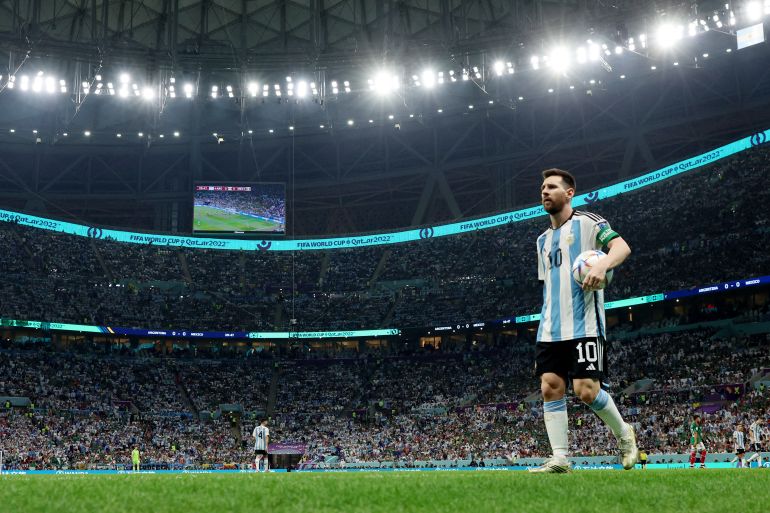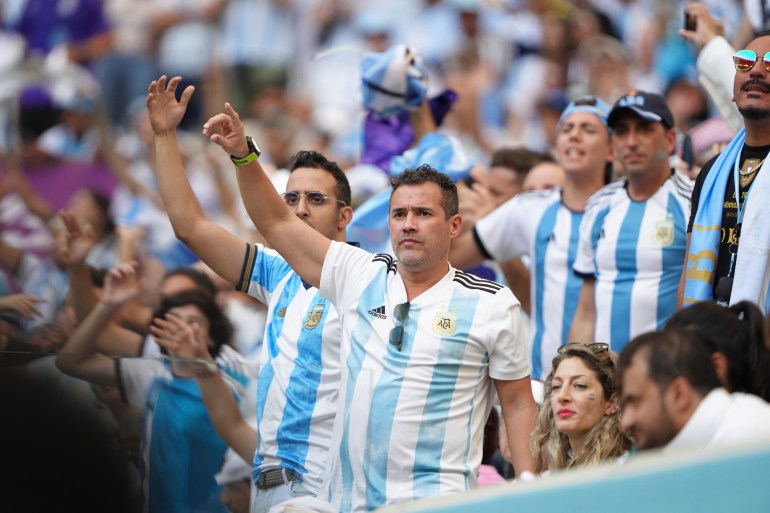‘Joy, sadness’: Football unites Argentina during World Cup 2022
Argentina’s fans hope for victory as they meet the Netherlands in World Cup quarter-final.

Buenos Aires, Argentina – Under a blue and white banner that read “No Player Is As Good As All Of Us Together”, a trio of teenage boys did pirouettes with a football.
On the other end of a vintage sports and social club called Eros, located in Buenos Aires’ Palermo neighbourhood, another group, about half their age but with double their energy, lobbed the ball into the goal.
Keep reading
list of 4 itemsNow or never: Does football owe Messi a World Cup?
What Messi means to Argentina and the World Cup
Argentina fans ‘want to win the cup for Messi’
The action in Buenos Aires comes as Argentina’s national football side prepares for its World Cup quarter-final match against the Netherlands on Friday in Qatar.
It’s a face-off between two great football nations in a tournament that has seen several giants sent home by underdogs.
Led by Lionel Messi, Argentina was one of the favourites going into this World Cup. A shock in the opening game against Saudi Arabia sent fans, who had been betting on some joy amid economic turmoil at home, reeling.
The spirits are higher again, however, as the side has shown progressively stronger performances, with flashes of brilliance from Messi and his teammates.
“Nervous” is how Matias, 15, one of the boys playing in the gym at Eros, summed up his feelings.
“I feel like Argentina can get to the final. I won’t say win it all, because I don’t want to jinx it, but we can get there,” he said.

It is difficult to overstate how big football is in Argentina. A pastime enmeshed so closely with national identity, the glory days of Maradona are a touchstone that no one will let go of.
Despite the painful inflationary crisis that has battered people’s wallets, Argentinians are among the highest ticket-purchasers for the tournament. Aerolineas Argentinas, the national carrier, launched a special flight to Qatar in time for the quarter-final which was sold out.
A livestream on Twitch by former footballer Sergio Aguero with Messi and other members of the team garnered 250,000 viewers.
“Whatever happens, for me you are all phenomenal people,” Aguero told the group. “Your victory always makes me very happy because it’s also mine.”
There is also the superstition that accompanies the World Cup.
Argentinians replicate behaviour that they come to associate with winning games. The boys at Eros all had theirs: Matias wears the same shorts and socks that he had during the wins. Santiago goes to the same restaurant and sits in the same chair with the same people for every game.
The World Cup is a unifying force in Argentina, Viviana Vila, a veteran sports journalist, said.
“It’s the only moment in which we are all brought to a standstill to live through the same emotion,” said Vila, who became the first Argentinian woman to do TV commentary during a World Cup in 2018.
“It might be joy, or it may be sadness. But for two or three hours, we will all live through the same emotion.”
She added that the team has many things going for it beyond, of course, counting the best player in the world among its ranks.
“They are a group of players who are completely capable of facing these circumstances with a coaching team that is skilled, world class, young, and low profile.”
After their abysmal failure of the last World Cup in Russia, where Argentina lost to eventual winners France in the last 16, the momentum now is on Argentina’s side, she said.
“This is the best Messi,” she added. “The most mature. It’s a fantastic team. The truth is that you have to play each game. There’s not much more we can say about it.”
Back at Eros, a big Argentina flag drapes over the liquor cabinet in the clubhouse restaurant, as fans whir in the oppressive heat of December.
Murals of Maradona adorn the club’s 80-year-old façade. A crowd of locals that has gathered here to cheer at every Argentina match will be back again on Friday, said club member Marcelo Krimer, 39.

“Football represents everything that is good,” he said, noting that he means specifically the sport, not the national and international governing bodies that run it “like a mafia”.
At Eros, families find community and support. They often have to force people to leave at night by turning the lights off.
“This is gold for childhood,” said Krimer, looking around at the boys playing in the gym. “It helps us forget about everything. I always say that coming to the club, to this space, it’s like removing your brain and putting it in a bucket of ice,” he grinned. “Then you leave and return to your life, your family, your job.”
For Jorge del Rio, 70, the club is an oasis in a concrete jungle. He has run a football school for children at Eros for 30 years. In a city like Buenos Aires, “the potrero” – the Spanish word for pasture, or rural pitch – where people like Maradona cultivated their skills, has all but disappeared, he said.
“We used to play on the street, and a car would pass by every now and then,” he said. “You can’t do that any more.”
